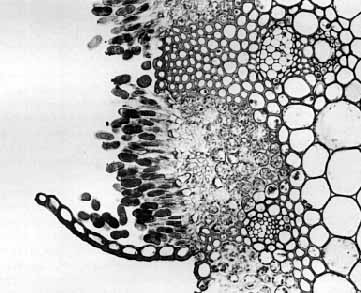
The primary goals of phytochemistry traditionally have been to discover new plant chemicals and to determine the distribution of natural products throughout the plant kingdom. Among respondents to the BSA survey, the most common current applications of these kinds of data involve the functions of plant natural products in biotic interactions.
 |
|---|
| Section through a uredinium of Puccinia graminis on a wheat stem. The urediniospores produced by a uredinium are responsible for the rapid spread of the disease called black stem rust of wheat. Courtesy: Ray F. Evert. |
The most critical needs in phytochemistry are in education and in basic research. Opportunities for undergraduate and graduate students to learn how to use the most modern instruments for isolating and identifying plant natural products are too limited. The applications of phytochemistry to recombinant DNA technology of crop plants and to medical botany rely heavily on knowledge from basic research.
At the moment, there is no set of funding programs at federal or international agencies or at private foundations that caters to education or basic research in phytochemistry. Most phytochemists are unable to do the work they are trained to do because of the lack of research funding, which is correlated with fewer students choosing to be trained in phytochemistry. This means that the would-be pillars of phytochemistry are weakening. Unless priorities in phytochemical research and education are recognized and supported, knowledge about plant chemistry that will be needed in other disciplines in biology will become dated or remain incomplete. It is therefore crucial to fund phytochemical research and to support programs for training professional phytochemists.
Phytochemists view themselves as perhaps the most interdisciplinary-oriented of all botanists and chemists. This is because plant chemistry has an impact on all areas of botany and on many areas of chemistry. Most phytochemists collaborate with scientists from other disciplines-ecology, agriculture, physiology, ethnobotany, medicine, organic chemistry and biochemistry; taxonomy, molecular biology, and plant pathology, among others. This is a natural strength of phytochemistry that should be recognized in the development of educational programs in other areas of biology and in the research priorities of universities and funding agencies.




